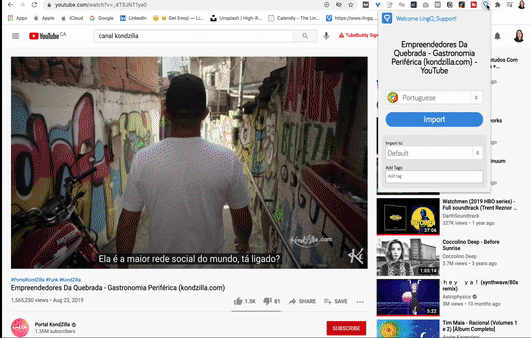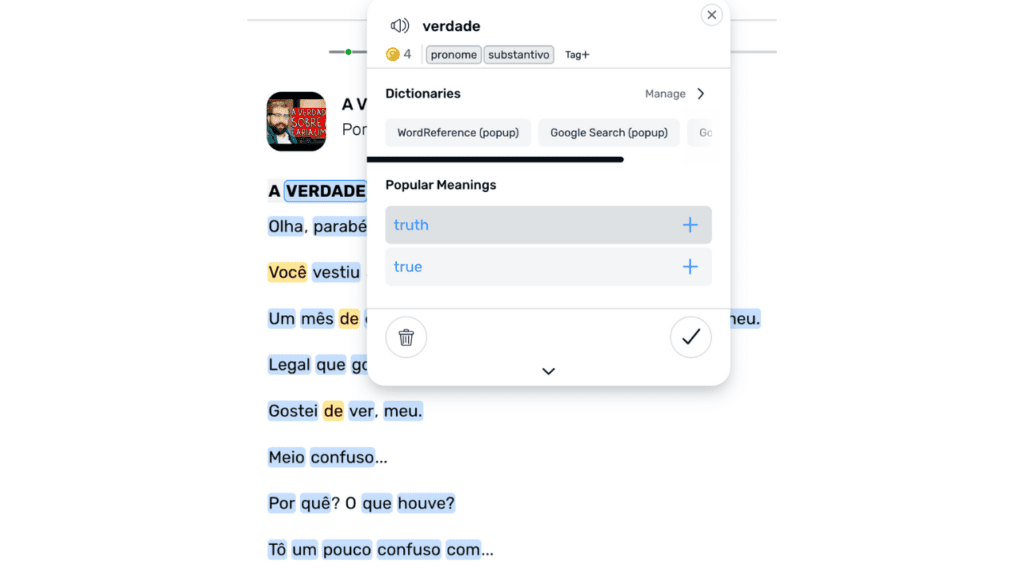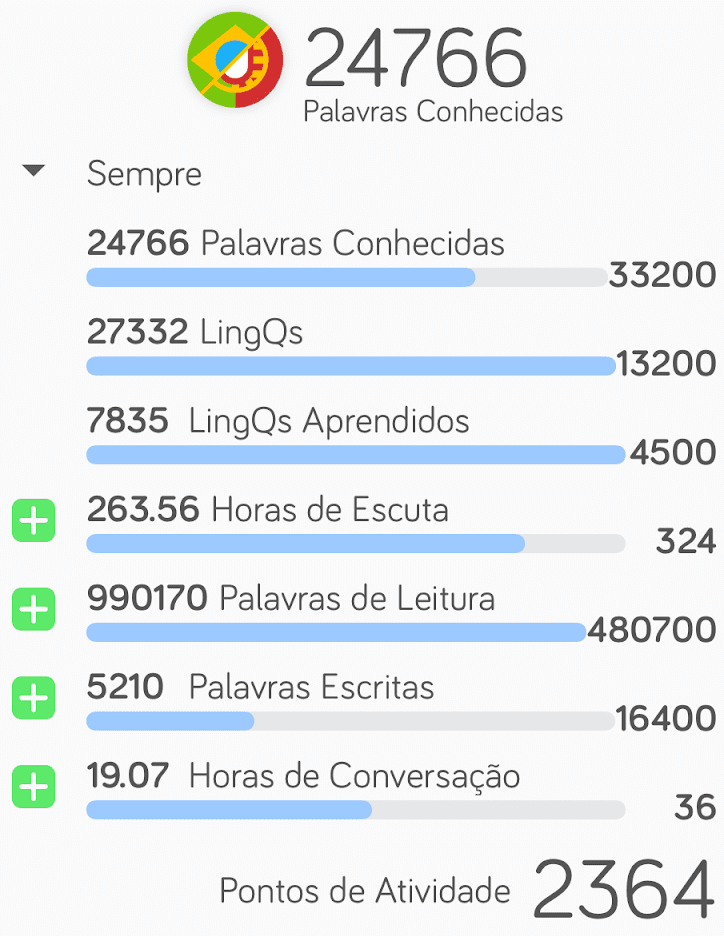How Hard is it to Learn Portuguese?
Don’t get me wrong. Portuguese is the most beautiful language in the world… to me, of course!
I have attempted to learn many languages but, when I met my beautiful future wife, who lives in southern Brazil, I decided to stick to it as much as I could and master the language. I had a LingQ account (an old one where I read about 20,000 words total), went through most of the Duolingo stories, and even hired a teacher and did several classes. I felt pretty confident! That is, I did until I actually moved to Brazil. I didn’t realize how wrong I was about my method until I actually had to use the language.
When I got to Brazil, in the midst of the pandemic, in the Uber ride, I realized I had understood almost nothing of the conversation between the Uber driver and my wife. We went to her mother’s house… I understood even less of their conversations!
When I started watching some Brazilian shows, I had to not only have subtitles but I realized that most people don’t even speak the way they do on Duolingo Stories and I only understood about half of all the subtitles!
I didn’t realize a couple of key aspects behind the language that make it inherently difficult and requires a lot of action and sustained studying to fix. What exactly should a learner of the language look out for when they begin studying? I suffered through the process to get to the fluency I have today after realizing these two difficulties: language change and accent differences.
Language Change
You know how Brazil was originally colonized by the European Portuguese? When the Europeans arrived, there wasn’t just a small stretch of empty land with no one there. In fact, Brazil was occupied by several different native American groups, each with their own languages and all with their own particular pronunciation systems.
The Portuguese were incentivized by their government to intermingle and marry with the inhabitants. When you marry somebody, you pick up their particular habits and start to become a bit more like them as the years go by. Brazilian Portuguese is the offspring of those colonizers and the natives already there. It blends much of the older pronunciation systems and the original Portuguese language. So much so that, oftentimes, European Portuguese sounds completely foreign to Brazilian speakers. In fact, according to some Brazilians I have talked to, it is almost unintelligible and, if you use European vocabulary, people may not even understand you at all.

I would be disingenuous in forgetting to mention the VERY large impact slavery had on the Portuguese language. Millions and millions of Africans were brought to Brazil, and they brought many different languages with them! The influence they had on Portuguese cannot be described in a mere article just as it would take an entire book! Accent differences, vocabulary, dance, music… much of Brazilian culture itself depends on that influence it had. Even though it was a terrible time in history, it is important to note Brazil would not be the same without it.
Accent Differences
But that’s not all! You remember that there were MANY different native tribes? Well, each group inhabited different parts of the land. After this intermingling, and generations went by, the accent differences became more noticeable. Each region, and sometimes each city, may speak an entirely different way. That doesn’t even count the massive immigration that has occurred since then as well!
Let’s take Curitiba, the city where I live. Very heavy central and Eastern European immigration had occurred in the past. So much so that, unfortunately, their accent is completely different from others in the country. They don’t pronounce a lot of the fricatives that can be found in other accents. Whereas other accents can be very guttural, Curitibanos pronounce a lot more letters than others.
This wouldn’t be a problem EXCEPT there are very few Curitibano entertainers or programs to watch on YouTube. In order to learn to understand someone, it is necessary to listen to them first. Most of the entertainment and programs come from Rio de Janeiro and Sao Paolo so most of the programs you see have entirely different accents and intonations than other cities. Oftentimes, in the more “country” accents you find, they don’t even pronounce the s in “mesmo” or the s at the end of other words.

In fact, sometimes, they don’t even pronounce the endings of words at all. “Sorte” means luck and has two syllables. But many Brazilians in the North pronounce it “sort” and pronounce the t like you would with the first t in “unfortunately:” with the tongue at the top of the mouth! Imagine everybody pronouncing words differently and you will realize you are going to need A LOT more exposure to the language. There are even accents that don’t pronounce the r with the r sound you’d find in English, and there are some who pronounce the r with a trilling sound that you’d find in Spanish. I felt, in the course of my studies, that, oftentimes, I would have to learn four or five ways to pronounce different words, which could be very frustrating!
How To Overcome It
There is only one way of overcoming the difficulties and LingQ has been the perfect resource for it: study a lot of input. I don’t mean just a lot. In order to get from understanding absolutely nothing to the point where I could be on a Brazilian podcast, and in SIX months, I took Steve Kaufmann’s approach of using LingQ to focus entirely on input. I set a goal for myself to read 5000 words and listen to 2.5 hours of audio every single day.
I used LingQ for all six months and kept track of absolutely everything in those six months. I managed to reach almost 1 million words read and 263 hours of listening practice. I used YouTube, Netflix, and novelas on GloboPlay (the Brazilian equivalent to Netflix) to fill in the gaps and get exposed to as many of the accents in the language I could. Ironically, despite moving here, I still can’t always understand the Curitiban accent but that’s due to the pandemic and never really leaving the house.

Where I Started And How I Progressed
As it is very important to start with content that you find both not too challenging but also interesting, I searched for content on YouTube that would let me improve my listening content: self-help videos! It seems strange today that THAT is where I started, but I found them to be perfect for an A2 level! I took the content and imported transcripts (using the extremely helpful browser extension available for Chrome, Safari, Firefox) to LingQ, learned every word and then went back and listened to them again until I felt comfortable with the words and understood the full content of the videos. I probably did this for the first 50 hours of listening practice that I did.

Eventually I came to the point where I didn’t think I could make it. But then at around the 30 hour mark, I found that I didn’t need LingQ as much because I already knew so many of the words and could really start enjoying the videos rather than trying to learn every single word over and over. I was getting the content without having to translate it. It was a breath of fresh air and the first major milestone.
At the same time, I joined a 90-Day Challenge where I would try to make as many LingQs as possible to beat everyone else. It was exciting, of course, to really challenge myself to take on very heavy goals. At the beginning, I started with 5000 words read every day. At the early level, I would set new LingQ records almost every day! I imported (through the extension again) dozens and dozens of articles by National Geographic Brasil, really building up my language core, making the articles, one-by-one, easier and easier to read. At some points I would reach up to 20000 words a day, and, around Thanksgiving, I had hit nearly 40000 words a day!
The real challenge was finding increasingly complex material to try to attack the “language difference” and “accent issue” head on. I found The Circle: Brazil to be absolutely perfect for this. Listening-wise, it is not super complex, but the actual vocabulary and range of accents… muito complexo! These people are all put into this little apartment building where they interact only through text messages. They would say soooo many different idioms in every episode I couldn’t keep up! I made hundreds of LingQs just from the series alone.
After mastering that material, I went a step further and started with Borges on Facebook! You might know the people as “Porta Dos Fundos” on YouTube. Complex comedy and idioms used in every episode. It’s wonderful! Everyone has their own particular way of speaking and it really helped with the accent issue. After watching this, I felt I was ready to start taking on shows without any subtitles.

LingQ is my best friend and mentor, but sometimes you have to let go of your mother’s hand to grow further! I stopped using LingQ for importing videos and focused on just watching videos trying to make sure I can watch them without subtitles. Sometimes, I’ll import a particular challenging video and realize that I have few LingQs associated with it. It’s just really hard to understand. The only way to grow that quality is to continue practicing without subtitles.
My journey with LingQ is far from over though! Remember when I said I read NGB articles? Yeah. I graduated! I now read entire novels through the LingQ app, oftentimes two or three novels at once if time allows. I love Star Wars novels and science-fiction so I have read a few. I believe this is a good way to really read extensively. I even uploaded The Handmaid’s Tale in English and I am reading that as well through the app, doing so with one of my students, discussing it in class.
Though Portuguese is a difficult language, as I said before, after so much study of it and the regional differences, I find it to be the most diverse and beautiful language I have ever studied and I think you should definitely give it a try. LingQ is the best app for doing this, with the ability to listen to the audio and follow along transcripts, and the data-driven approach that you can take with it, the way I did. 320 total hours of study do not lie. LingQ works! Check out LingQ today to discover how to learn Portuguese from content you love!
***
Michael Simpson is the owner of TryLingual, and is a private language coach and English teacher currently living in Curitiba, Brazil. He loves coxinha and churrasco and watching Brazilian novelas with his wife. He thinks if a goofball like him can learn any Portuguese, so can you!



